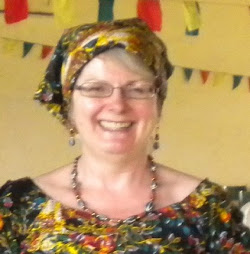Water water everywhere, and not a drop to drink!
Well that's a bit inaccurate really, as we can get plenty of bottled mineral water from our local store. We drink between 2 - 3 litres a day each, depending on the heat. And Gweneira lived on little else for 5 days while she was flushing out some kind of bug.
Flushing - that's a word that features larger in our volunteer vocabulary than it ever did in Wales! Getting and collecting enough water to do the necessary takes quite a bit of our time, and we've been lucky to have running water from the tap for part of most days so far. Up in Santa, my colleague Kareen had no water for 8 days, and was overjoyed when it flowed long enough to catch up on some washing. Stand pipes are in each area, and we see people crowding round them with large containers and wheeled trolleys.
There is such a serious water shortage here that each locality has some kind of rationing. One problem as an inhabitant is that there's no regular schedule, so it's unpredictable. When we have water, we rush to fill all our containers. This morning I counted 96 bottles full, plus all the large buckets and bowls we possess. We collected about 4 buckets full of rainwater the other evening, dirty stuff but OK for the loo.
For washing and cooking vegetables, making hot drinks and rinsing crockery we use water that we boil and then filter. It doesn't taste great, so neither of us enjoys drinking it cold, but it is clean. So when we have running water, we boil up a large saucepan of tap water so we can fill up the filter.
Washing ourselves usually means using a bowl, bucket and scoop. We do have a shower, but no water ever comes out of it - pressure much too low! Being a softie, I add some boiled water to my bowl when washing my hair. I've been thankful for a tip from a neighbour at home to bring dry shampoo - it's so useful here. But then washing my hair in a bowl just shows how dirty it is - brown water as if I was rinsing out hair dye!
Of course we all do our clothes washing in cold water. I have no idea how Cameroonian people manage to keep their clothes so clean. You see Omo-white shirts crisply ironed, on people living in far worse conditions than us. The laundries are too expensive for most people, and there's no such thing as a laundrette, though I have seen washing machines out for sale by the roadside.
Ironing is essential, for anything that's been dried outside. Have I mentioned the tumbu fly? It lays eggs in any clothing or sheets drying in fresh air, then when they hatch they burrow into your skin! To prevent that you have to use a hot iron on everything, especially the seams - even bras and knickers!
Why does Cameroon have all these water problems? Especially with the amount of rain we've had in the past week, it's hard to understand. Some villages have no steady water supply at all, even for health centres, and it's certainly a priority on most wish lists.
I've asked for reasons, of course. First, electricity is a problem - lots of power shortages and surges, which affects water pumps. Bad weather knocks our electricity off most evenings now. Then the pipes are inadequate - certainly domestic plumbing wouldn't win any prizes, so I guess the same applies to the main systems. Infrastructure issues loom large here, and it's beyond me, but it certainly makes me appreciate what we have in Wales. I won't waste a drop in future!






1 comment:
Yes, I remember this fly well from Guinée - but we called it the Mango fly. Nasty. I did some post grad papers Women and Water in the Highlands of Guinée - so I could relate to this story - one of the first things the project Bob was working on did was to manage springs to bring clean water to villages. When the water was clear people didn't trust it - until they realised they were no longer getting sick.
Post a Comment